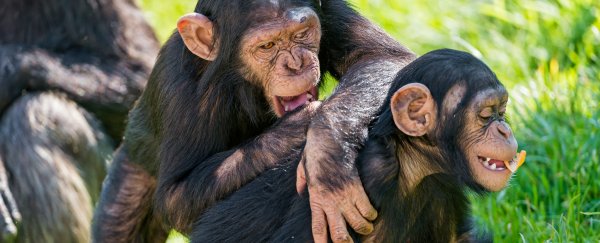Yesterday, for the first time in US history, a New York Supreme Court Justice declared that two chimpanzees were "human" in the eyes of the law. And then a few hours later amended the wording, claiming that it was all a mistake.
The court order containing the declaration was in response to cases put forward by animal rights organisation Nonhuman Rights Project (NhRP), which claimed that two lab chimpanzees, Hercules and Leo, kept at Stony Brook University in New York along with two other privately owned chimps, were intelligent enough to be given basic human rights - specifically, the freedom to challenge their captivity.
The end goal is for the chimps to be released to the Save the Chimps sanctuary in Florida, but NhRP also hopes to convince a judge that apes should be given basic human rights, rather than treated as private property.
The cases were originally dismissed back in 2013, but after a recent appeal, New York Supreme Court Justice Barbara Jaffe issued a court order demanding a hearing with Stony Brook University using a writ of habeas corpus, which essentially declared that the chimpanzees were legally people.
The decision resulted in huge celebrations from animal rights groups around the world. "Wow. Wow. Wow. This is incredible," Mary Lee Jensvold, a primatologist and former director of the Chimpanzee and Human Communication Institute, told Brandon Keim from Wired. "I didn't think this would happen so soon. It takes so long for attitudes to change. It's a great piece of news, just to know that a judge wants to hear the case."
But a few hours later, Jaffe claimed that the habeas corpus wording had been a mistake, and struck it out from the court order.
However, the hearing will still take place on May 6th, and NhRP Project will have a chance to discuss the chimps' legal status and prove that Leo and Hercules are being held unlawfully at Stony Brook, where they've been used to understand the evolution of human bidepalism, and they're pretty excited about it.
"These cases are novel and this is the first time that an Order to Show Cause has issued," NhRP said in a statement. "We are grateful for an opportunity to litigate the issue of the freedom of the chimpanzees, Hercules and Leo, at the ordered May hearing." Stony Brook University wouldn't comment on the case.
Richard Cupp, a law professor at Pepperdine University in California, who isn't involved in the case, predicted that the wording was a mistake as it came before the hearing. "It would be quite surprising if the judge intended to make a momentous substantive finding that chimpanzees are legal persons if the judge has not yet heard the other side's arguments," he told Science.
The other NhRP appeals weren't as successful. The two privately owned chimps - one is kept in a warehouse in Gloversville, New York, and one owned by a couple in Niagara Falls - had their appeals overturned with one judge claiming that the Save the Chimps sanctuary is essentially another form of captivity, and another declared that rights can only be given to individuals capable of fulfilling social obligations and responsibilities, as Keim explains for Wired.
But things are definitely progressing. At the end of last year an Argentinian court declared that an Orangutan called Sandra was a "non-human person" and had been unjustly imprisoned at the Buenos Aires Zoo. And this appeal itself is still a big step forward according to Natalie Prosin, the executive direction of NhRP.
"This is a big step forward to getting what we are ultimately seeking: the right to bodily liberty for chimpanzees and other cognitively complex animals," Prosin told David Grimm over at Science. "We got our foot in the door. And no matter what happens, that door can never be completely shut again."
